|
|
|
Sort Order |
|
|
|
Items / Page
|
|
|
|
|
|
|
| Srl | Item |
| 1 |
ID:
190340
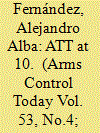

|
|
|
|
|
| Summary/Abstract |
Ten years ago, the Arms Trade Treaty (ATT) was adopted by the UN General Assembly with the promise to establish common standards for the international trade in conventional arms in order to reduce the terrible human consequences caused by the illegal, irresponsible transfers of these weapons.
|
|
|
|
|
|
|
|
|
|
|
|
|
|
|
|
| 2 |
ID:
138048
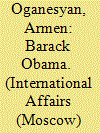

|
|
|
|
|
| Summary/Abstract |
DURING his 40-minute-long address to the UN General Assembly, President Obama sounded less like a president and more like a prophet" or a preacher with a mission to reveal the truth about the world to mankind. The host is expected to be restrained, especially in view of the realities of the day. This time, the host pushed aside all rules to confirm the old truth that weaker positions are defended by stronger rhetoric. It seems that time has come for the UN Security Council and General Assembly to revise the tradition of long introductory speeches. Indeed, people who represent the world community are exposed to endless bragging and all sorts of opinions voiced by the leader of one, even if the most influential, country.
|
|
|
|
|
|
|
|
|
|
|
|
|
|
|
|
| 3 |
ID:
181364
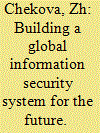

|
|
|
|
|
| Summary/Abstract |
THE YEAR 2020 made it abundantly clear that the world is firmly and apparently immutably digitalized. All countries, regardless of their level of political, military, socioeconomic, and technological development, use information and communications technologies (ICTs) in various fields. But governments are certainly not the only users of ICTs. Companies, research and educational institutions, nongovernmental organizations, and civil society have swiftly adapted their work to the virtual format. It is convenient, accessible, and during the COVID-19 pandemic, often the only possible format. It would not be an exaggeration to say that the digital space has become a familiar habitat for most of the world's population.
|
|
|
|
|
|
|
|
|
|
|
|
|
|
|
|
| 4 |
ID:
086467
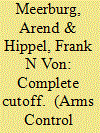

|
|
|
|
|
| Publication |
2009.
|
| Summary/Abstract |
President Barack Obama has pledged to "lead a global effort to negotiate a verifiable treaty ending the production of fissile materials for weapons purposes."[1] Fissile materials are the chain-reacting fissionable materials that are the essential ingredients in nuclear weapons, in practice, highly enriched uranium (HEU) and separated plutonium. Obama is not the first president to back the negotiation of such a treaty: President Bill Clinton did so after the UN General Assembly in 1993 adopted by consensus a resolution calling for negotiation of a "non-discriminatory, multilateral and internationally and effectively verifiable treaty banning the production of fissile material for nuclear weapons or other explosive devices."[2] Even the administration of President George W. Bush tabled a draft treaty at the Geneva-based Conference on Disarmament (CD), albeit without international verification.
|
|
|
|
|
|
|
|
|
|
|
|
|
|
|
|
| 5 |
ID:
150291
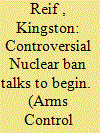

|
|
|
|
|
| Summary/Abstract |
A supermajority of UN member states is set to begin negotiations early next year on a treaty to prohibit nuclear weapons amid uncertainty about how long the talks will last; the content of the new instrument, as well as other legal and technical issues; and how many states that rely on nuclear deterrence for their security will participate.
|
|
|
|
|
|
|
|
|
|
|
|
|
|
|
|
| 6 |
ID:
150323
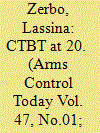

|
|
|
|
|
| Summary/Abstract |
On December 16, I attended a ribbon-cutting ceremony in Lanzhou, China, to mark the first certification of an International Monitoring System (IMS) station in China’s national network of 11 facilities being established to monitor global compliance with the Comprehensive Test Ban Treaty (CTBT). This represents a milestone for the treaty and illustrates the real progress that has been achieved in cooperating with China on nuclear test monitoring and verification challenges.
|
|
|
|
|
|
|
|
|
|
|
|
|
|
|
|
| 7 |
ID:
139345
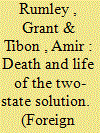

|
|
|
|
|
| Summary/Abstract |
On March 17, Israeli Prime Minister Benjamin Netanyahu won reelection, thanks in part to a desperate last-minute pledge to his right-wing base that the Palestinians would never get a state so long as he was in power. After the election, he tried to walk his comments back, but Palestinian observers weren’t buying it. As one person close to the Palestinian leader Mahmoud Abbas put it, Netanyahu’s reelection marked the end of an era, “the final closing of the window of opportunity for a negotiated solution.” The insider continued: “Two years ago, [U.S. Secretary of State] John Kerry told the U.S. Congress that in a matter of a year and a half, or two years at most, the window will close. He was right. It’s over.”
|
|
|
|
|
|
|
|
|
|
|
|
|
|
|
|
| 8 |
ID:
139787
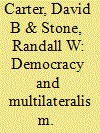

|
|
|
|
|
| Summary/Abstract |
Democracies are more supportive of US positions on important votes in the UN General Assembly than of nondemocracies. Is this because democracies share common perspectives, or does this pattern reflect coercion? Since 1985, US law has stipulated that the US State Department identify important votes and that aid disbursements reflect voting decisions. To unravel these alternative explanations, we introduce a strategic statistical model that allows us to estimate voting preferences, vulnerability to influence, and credibility of linkage, which are theoretical quantities of interest that are not directly observable. The results reject the hypothesis of shared democratic values: poor democracies have voting preferences that are more oppositional to US positions than autocracies, and they are more willing than autocracies to take symbolic stands that may cost them foreign aid. Democracies support US positions, however, because US aid linkages are more credible when directed toward democratic countries. Splitting the sample into Cold War and post–Cold War segments, we find that the end of the Cold War changed the way US linkage strategies treated allies and left- and right-leaning governments, but the effects of democracy remained constant.
|
|
|
|
|
|
|
|
|
|
|
|
|
|
|
|
| 9 |
ID:
151727
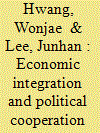

|
|
|
|
|
| Summary/Abstract |
South Korea has traditionally maintained close ties with the United States, especially for external security, while more recently it has become closer to China, mainly for economic reasons. In this article we examine whether growing economic ties between South Korea and China promote their cooperation and common policy preferences and simultaneously weaken Korea-US relations. We examine the voting congruence of South Korea and China in the United Nations General Assembly between 1991 and 2012 and find no clear evidence that economic integration promotes congruence. Rather, South Korea's policy preferences are usually determined by independent consideration of issues.
|
|
|
|
|
|
|
|
|
|
|
|
|
|
|
|
| 10 |
ID:
138047
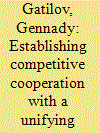

|
|
|
|
|
| Summary/Abstract |
G. Gatilov: Every session of the UN General Assembly is a landmark event that not only sums up the results of the past political year and assesses the status of international relations at the current stage, but also sets out a vector for future movement forward. As they say, the UN, like a mirror, reflects global processes in the political, economic and human rights spheres, as well as collective security issues
|
|
|
|
|
|
|
|
|
|
|
|
|
|
|
|
| 11 |
ID:
182568
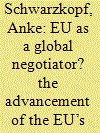

|
|
|
|
|
| Summary/Abstract |
This paper aims to account for the EU’s role in multilateral negotiations at the UNGA by looking at the negotiations on the enhanced observer status. During the negotiation process, the EU experienced significant opposition and had to accept an intermediate setback in form of a postponement of the vote. Despite this, the EU’s enhanced observer status was adopted by the UNGA in May 2011 as resolution 65/276. This research contributes to the understanding of the EU as an actor in multilateral negotiations and the interaction between state and non-state actors. I argue that the EU is in the process of establishing itself as an active and recognized actor at the UN and determining its role as a highly integrated regional organization and non-state entity in the state-centric environment of the UNGA. I analyse the negotiation process and the final agreement through the lenses of a bargaining approach and as an alternative, mutual recognition as global justice.
|
|
|
|
|
|
|
|
|
|
|
|
|
|
|
|
| 12 |
ID:
118646
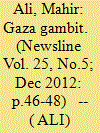

|
|
|
| 13 |
ID:
138037
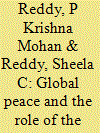

|
|
|
|
|
| Summary/Abstract |
The United States must expand its role and shift focus from the prevention or containment of military conflict to the achievement of comprehensive global peace by ensuring the satisfaction of basic needs for the poorest sectors of humanity.
|
|
|
|
|
|
|
|
|
|
|
|
|
|
|
|
| 14 |
ID:
160980
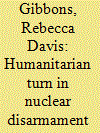

|
|
|
|
|
| Summary/Abstract |
On July 7, 2017, at the UN General Assembly, 122 states voted to adopt the Treaty on the Prohibition of Nuclear Weapons. This was the culmination of the work of a global network of states and grassroots activists that emphasized the devastating humanitarian consequences of nuclear-weapons use in order to delegitimize their possession. Advocates of the ban treaty are frustrated with the slow pace of nuclear disarmament through traditional channels. This article traces the history of the ban movement from 2005 to the present. It concludes by highlighting six factors that led to the successful adoption of the treaty: a small group of committed diplomats; an influx of new coalition members; the contribution of civil society; the reframing of the narrative surrounding nuclear weapons; the pursuit of a simple ban treaty; and the context provided by the Barack Obama administration.
|
|
|
|
|
|
|
|
|
|
|
|
|
|
|
|
| 15 |
ID:
114499
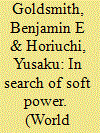

|
|
|
|
|
| Publication |
2012.
|
| Summary/Abstract |
Does "soft power" matter in international relations? Specifically, when the United States seeks cooperation from countries around the world, do the views of their publics about US foreign policy affect the actual foreign policy behavior of these countries? The authors examine this question using multinational surveys covering fifty-eight countries, combined with information about their foreign policy decisions in 2003, a critical year for the US. They draw their basic conceptual framework from Joseph Nye, who uses various indicators of opinion about the US to assess US soft power. But the authors argue that his theory lacks the specificity needed for falsifiable testing. They refine it by focusing on foreign public opinion about US foreign policy, an underemphasized element of Nye's approach. Their regression analysis shows that foreign public opinion has a significant and large effect on troop commitments to the war in Iraq, even after controlling for various hard power factors. It also has significant, albeit small, effects on policies toward the International Criminal Court and on voting decisions in the UN General Assembly. These results support the authors' refined theoretical argument about soft power: public opinion about US foreign policy in foreign countries does affect their policies toward the US, but this effect is conditional on the salience of an issue for mass publics.
|
|
|
|
|
|
|
|
|
|
|
|
|
|
|
|
| 16 |
ID:
138054
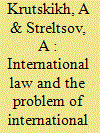

|
|
|
|
|
| Summary/Abstract |
THE IMPACT of information and communication technologies (ICT) on all aspects of human life, society and the State cannot be overemphasized. Apart from the obvious benefits in terms of economic, social and cultural development, the enhancement of the role of ICT in the contemporary world inevitably brings new risks for international and national security. There is already real evidence that the damage from the use of ICT for purposes contrary to the Charter of the United Nations, as well as for criminal and terrorist purposes may be comparable to the most destructive weapons. The list of potential targets for information weapon attacks includes not only the information resources of the Internet, but also the critical infrastructures of States in the industry, transport and energy sectors. What's more, the scale and technological level of such destructive impact are steadily increasing.
|
|
|
|
|
|
|
|
|
|
|
|
|
|
|
|
| 17 |
ID:
138324
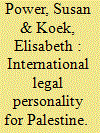

|
|
|
| 18 |
ID:
189867
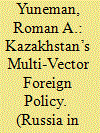

|
|
|
|
|
| Summary/Abstract |
The concept of multi-vector policy underlies Kazakhstan’s foreign policy
strategy. However the implementation of this strategy in the UN General
Assembly has not yet been studied. In this work, the author analyzes voting
cohesion of Kazakhstan and Russia, China, the U.S., and Germany in 2007-
2022, and also studies Kazakhstan’s behavior when the above countries
voted oppositely. Based on a quantitative and qualitative analysis of voting
on more than a thousand resolutions concerning international relations or
foreign policy, the author concludes that the main vector of this policy is
not Russia, which is formally a key ally of Kazakhstan, but China. Most often
Kazakhstan’s foreign policy position is identical to that of China (and least
of all to that of the United States). In addition, Kazakhstan avoids offering
explicit support to Russia on initiatives related to armed conflicts, including
the one in Ukraine.
|
|
|
|
|
|
|
|
|
|
|
|
|
|
|
|
| 19 |
ID:
150296
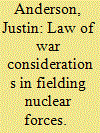

|
|
|
|
|
| Summary/Abstract |
The status of nuclear weapons within international law was a subject of intense debate during last fall’s UN General Assembly First Committee session. State supporters of the humanitarian initiative on nuclear weapons pressed for resolutions asserting the illegality of nuclear weapons and sought to build support for the near-term negotiation of a global ban on nuclear arsenals.
|
|
|
|
|
|
|
|
|
|
|
|
|
|
|
|
| 20 |
ID:
121703
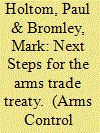

|
|
|
|
|
| Publication |
2013.
|
| Summary/Abstract |
On April 2, the UN General Assembly adopted the text of the Arms Trade Treaty (ATT) by a vote of 156-3, with 22 abstentions.[1] After the treaty is opened for signature early this month, countries will sign it and prepare for its ratification according to their national procedures for considering treaties. The ATT requires ratification by 50 states before it can enter into force.
|
|
|
|
|
|
|
|
|
|
|
|
|
|
|
|
|
|
|
|
|